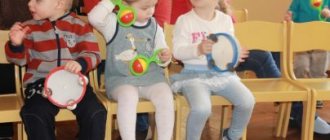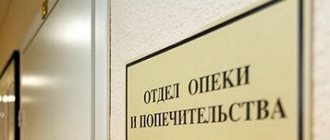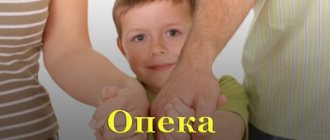Guardianship authorities are engaged in protecting the rights of minors; these services visit families that are classified as disadvantaged (alcoholics, drug addicts, etc.). The appearance of guardianship authorities on the threshold is, as a rule, due to a number of reasons and often applies only to persons under their control. But the presence of circumstances of a certain nature can lead such services to a full-fledged family. In what cases is a residential premises inspected by guardianship authorities even if the family is not registered?
Why does she come
Guardianship officials may come to check a house where minors live if they have received a message about a threat to the life and health of children.
For example, neighbors said that heart-rending screams could be heard from the apartment for several hours in a row. Or a kindergarten teacher discovered suspicious bruises on the child’s body. Or the doctor at the hospital thought that the baby was too skinny. Guardianship is obliged to respond to all signals. The goal of the inspectors is to protect children, or to make sure that their life and health are not in danger.
If they don't take the child and he then gets hurt, they will be accused of neglect. And if they take away a child without sufficient grounds, they will be accused of abuse of authority.
A threat to the life and health of a child is considered, in particular, by the lack of care appropriate to his age and state of health. For example, if parents do not feed a primary school child or leave the baby alone in the apartment.
Guardianship and trusteeship authorities work only on weekdays. On weekends and at night, the police respond to calls about children in danger. She can remove children as “neglected.”
Neglected children are those whose parents do not fulfill their responsibilities for their maintenance, training and upbringing. (Recently, the Ministry of Internal Affairs proposed to amend the RF IC to allow the police to temporarily move children to a safe place, and not permanently remove them with a mandatory claim for deprivation of parental rights).
Requirements for the child’s place of residence
The requirements for an apartment or residential building in which a child lives are determined by the Procedure for conducting a survey of the living conditions of minors, approved by Order of the Ministry of Education No. 4 of January 10, 2019.
According to paragraphs. 6.1 - 6.4 of this document, the residential premises in which the child lives must meet the following requirements:
- living condition of the apartment or house;
- area and number of rooms in an apartment or house (according to the number of residents);
- improvement of living space, availability of repairs, furniture, household appliances, communications, electricity and water supply, heat;
- order and cleanliness in all rooms, absence of dampness, foreign odors, parasites (rats, bedbugs, flies, cockroaches), fresh bedding and clean dishes;
- safety (according to the child’s age: no risk of falling or injury, no access to electrical appliances, gas, sharp objects, instruments, medicines);
- the presence of a separate place (room or furnished area) for sleep, leisure, play, education of the child under his care;
- availability of food and/or ready-made food (according to the age of the child under care);
- availability of hygiene items (diapers, soap, washing powder).
What does the Guardianship and Trusteeship Authority check?
The area of an apartment or house, the number of rooms and residents, the presence of a separate room (or part of a room with a sleeping and “working” place) for a child are important, but not the most important indicators that representatives of educational institutions take into account. Especially if the inspection is unscheduled, ordered in connection with a report of a possible violation of children's rights.
During the inspection, representatives of the PLO must establish:
- Child's health status . There should be no signs of violence on the body of the child under guard (bruises, bruises, wounds), it should not look painful, emaciated or dehydrated;
- Grooming and cleanliness of the child’s body, face, hands, hair;
- Clothes and shoes . The child must wear clean and tidy clothes and shoes that are appropriate for his age, size, and season;
- Socialization , behavior and manners, communication skills of the child with relatives (parents, guardian/trustee, brothers and sisters) and strangers;
- The emotional state of the child;
- Upbringing and education , intellectual development. Attending kindergarten or school (according to age and development);
- The relationship of the child in his care with parents, guardian/trustee, and other relatives;
- Financial situation;
- Other circumstances that may indicate a violation of children's rights.
The main purpose of the inspection is to establish the safety and suitability of the residential premises for the child to live in, to ensure that the child’s needs (physical, mental, intellectual) are properly taken care of, to ensure the successful development and absence of a threat to the life or health of the child from parents, guardians/trustees, or outsiders persons
Expert opinion
Dmitry Nosikov
Lawyer. Specialization: family and housing law.
What do guardianship authorities pay attention to first?
One of the most common questions parents and guardians/trustees ask while awaiting an inspection is: What does the guardian look for during a residential inspection?
Since the first impression is the strongest, you need to meet PLO representatives in a clean and tidy manner. The quality of repairs, the high cost of furniture and appliances mean no more than the cleanliness and safety of the living space. Living rooms, kitchen, bathroom and toilet - everything must be clean and hygienic, safe for the child’s health.
Of course, in everyday life you cannot avoid stains, dust, and odors. But if representatives of the OOP find heaps of dirty clothes or dishes, cockroaches, drafts from windows, cold and dampness, lack of water, electricity or gas, which looks like the usual state of affairs, they will have to issue a warning or take measures to remove the child.
Powers of inspectors
Representatives of the PLO are not endowed with unlimited powers. Therefore, it is better for parents, guardians and trustees who are awaiting a visit from inspectors to understand in advance which actions are permissible and which are already abuse or violation.
The inspection of the housing is carried out by a representative of the public educational organization: independently or with the involvement of representatives of the school, kindergarten, clinic or hospital, or social protection authority.
During the check the following are allowed:
- inspection of all premises in an apartment or house (in the presence of the owner or tenant);
- inspection of a place (a separate room or part of a room) that is allocated for the child: for sleep, play and leisure, creativity and learning;
- conversations with the child, mother and father, guardian/trustee: about family life, the child’s leisure time and time spent together, methods of education, everyday circumstances;
- interviewing other people: relatives, neighbors, educators and teachers;
- observation of relationships, behavior, conversations, and everyday habits of the family;
- studying documents.
Representatives of the PLO do not have the right to inspect the refrigerator, bathroom and kitchen shelves, wardrobes, but may ask the parents, guardian or trustee to show food, hygiene items (for example, diapers, diapers) intended for the child.
How should parents, guardians and trustees behave?
The most common and serious mistake that frightened parents, guardians or trustees make is to interfere with the PLO employees in carrying out the inspection: not opening the door, not answering calls, threatening to call the police or sue.
Even if the reasons for the inspection seem unfounded to you (for example, reports from neighbors about abuse of their son or daughter are false), it is much more reasonable to politely and respectfully present this circumstance to the inspection officials.
Parents, guardians or trustees have the right to ask a representative of the educational institution to show official documents: a certificate, order or resolution on a scheduled or unscheduled inspection.
It would not be superfluous to invite a witness during the inspection - a local doctor (for example, if the reason for the inspection is a child’s injury), a teacher or educator, a relative, a neighbor. This will allow you to maintain a calm and friendly environment, avoid violations or abuse of authority on the part of the inspector, and monitor compliance with the law.
Remember that the removal of a child from the family (Article 77 of the RF IC), as well as restriction or deprivation of parental rights, is possible only on legal grounds and in accordance with the procedure prescribed by law.
Residential inspection report
Based on the results of the inspection, representatives of the public educational institution must draw up an Act - a document that contains information about the living quarters, the presence or absence of proper care for the child (clothing, food, warmth, cleanliness and safety), the presence or absence of circumstances that threaten the life or health of the child , hinder its full development, as well as conclusions and recommendations regarding the protection of the rights of the child.
The document includes the following data:
- OOP data: name, address;
- date of drawing up the Act;
- information about the child: full name, date of birth, place of residence;
- details of the child’s birth certificate or passport;
- details of the child’s legal representative: mother, father, guardian or trustee: full name, date of birth, place of residence;
- information about the child’s parents (full name, date of birth, place of residence, marital status, reasons for restriction or deprivation of parental rights);
- statement of the results of the inspection:
- data about the child (health status, socialization, appearance, upbringing and education);
- family and social connections (relatives, friends);
- living conditions (improvement of a house or apartment, area and number of rooms, condition, availability of a separate room or part of a room for sleeping, leisure, education of the child);
- family income data;
- information about the child’s property;
- circumstances that pose a danger to the life or health of the child;
- conclusion;
- signatures.
The act is drawn up on a standard form.
The form of the form and the period for preparing the Certificate of Inspection of the Residential Premises depends on the grounds and reasons for the inspection:
- if an inspection of a residential premises where a minor child lives is carried out on the basis of a received report of a violation of the rights of a child , an act form approved by Order of the Ministry of Education of Russia dated January 10, 2019 No. 4 (Appendix No. 3) is filled out - within 3 working days after the inspection .
- if a scheduled inspection is carried out at the place of residence of a child under guardianship , the report form approved by Order of the Ministry of Education and Science of the Russian Federation No. 1642 of December 29, 2014 is filled out within 10 days after the inspection (according to clause 11 of the Rules approved by Decree of the Government of the Russian Federation No. 423 of May 18. '09)
- if an inspection of the place of residence of a citizen who wants to become a guardian or trustee is carried out, an act form approved by Order of the Ministry of Education of Russia No. 4 of January 10, 2019 (Appendix No. 5) is filled out - within 3 days (according to clause 8 of the Rules approved by the Decree of the Government of the Russian Federation No. 423 dated May 18, 2009).
The report is drawn up in two copies and signed by the officials who conducted the inspection. One copy of the act, certified by the head of the educational institution, is sent to parents, guardians or trustees.
If the parents or other legal representatives of the child do not agree with the results of the inspection set out in the Act, the document may be challenged in court.
Is it possible not to allow guardianship representatives into the house, and what will happen to this?
A citizen has the right not to allow guardianship and trusteeship officials into his home. But this approach can have two consequences.
On the one hand, not opening the door to strangers is not a crime. The guardianship staff will write in the report on the inspection of living conditions that they were not provided with access to the living quarters. But they will not be able to criticize the sanitary condition of the apartment and document the lack of ready-made food.
Finally, they will not be able to take the child to a shelter where he will be questioned by strangers. After all, it is unknown how outsiders, even experienced and competent ones, will interpret children’s stories, and how this information will be used later, in court about the deprivation of parental rights.
On the other hand, guardianship officials who receive a signal that a child is in danger may call the police. And the police, if they consider the threat real, will break down the door. After which the child can still be taken away.
Moreover, if it turns out that the parents are not at home at that moment, even if there are other adults (for example, a grandmother) in the house, the child may be considered neglected.
Alternatively, you can try through the door to schedule another day for the visit in order to better prepare, or arrange a meeting on the territory of the guardianship authority.
Rights of family and parents
When guardianship authorities appear on the doorstep, it is worth remembering that they can only get into an apartment or house:
- if the family voluntarily lets them in;
- or they have an official document from the prosecutor for this purpose.
If there is no document, then these workers can not be allowed in, since in accordance with the law citizens have the rights:
- on the inviolability of residential premises;
- privacy.
Also, before allowing employees of such an organization into their home, citizens have the right to check all their documents proving both their identity and their place of work, and if they have permission from the prosecutor’s office to conduct this examination, they have the right to familiarize themselves with it.
No one is safe from visits by these employees, but you shouldn’t panic, you should know your rights and if they don’t have good reasons, then you can’t let them into the apartment at all. But if this happens, then it is worth carefully studying all the documents drawn up, and in cases of disagreement with the drawn up act of conducting a survey of the living conditions of minor citizens, you can go to court for review.
What will guardianship officials do in the apartment?
The group of officials who came to check the living conditions of the family, in addition to representatives of the guardianship and trusteeship authority, may include employees of the commission for minors, social services, clinics and police.
Each of them must introduce themselves. But special attention should be paid to the representative of the guardianship and trusteeship authority, because he has the greatest powers.
Inspectors will assess the condition of the apartment: whether it needs cosmetic or major repairs. They will look to see if the house is clean, if the minor has a place to study and relax, if there are seasonal clothes hanging in the closet, if there are food products in the refrigerator “appropriate for the child’s age.”
Of course, their opinion will be subjective: anyone can say that the floor is not cleaned well, there is not enough space to play, and pasta and stew are not suitable for feeding a preschooler. But parents can still prepare for the visit of guardianship officials - by tidying up, for example.
In addition to cleanliness and order in the house, the commission will be interested in the following points:
– family income (according to the law, the difficult financial situation of parents cannot be the only reason for taking children away)
– alcohol or drug addiction of parents;
– presence or absence of a criminal record;
– whether other children from this family are being raised in orphanages;
– whether the parents were brought to administrative responsibility;
– psychiatric status of the parents (people registered in a psychoneurological dispensary can raise children if they are not deprived of legal capacity);
Having clarified the situation on all these points, the guardianship officer will ask questions related to the upbringing, maintenance, treatment and education of children that he deems necessary.
From a lawyer
An inspection of the residential premises in which you live with your child or child under your care must be carried out in strict compliance with the law. The purpose of its conduct is not to violate the rights of the child and his parents, trustees or guardians, but to make sure that there is no threat to life or health.
A visit by PLO representatives rarely occurs suddenly and without reason. As a rule, it is preceded by conflicts with neighbors or relatives, educators, school teachers or doctors, as well as written warnings or conversations with representatives of the PLO. This allows you to prepare for the upcoming meeting, study your own rights and responsibilities of officials.
A mandatory stage of the procedure is drawing up an Inspection Report and submitting the document for review or challenge no later than 3 days (10 days) .
Expert opinion
Semyon Frolov
Lawyer. 7 years of experience. Specialization: family, inheritance, housing law.
If you believe that the inspection of a house or apartment was carried out without reason, without compliance with the law, if the Inspection Report contains inaccurate information, you have the right to appeal the actions or inactions of representatives of the PLO in court, having previously secured the support of a lawyer. You can ask a question and get a free consultation on any issue related to guardianship and protection of children's rights - by calling the hotline or via chat.
Attention!
- Due to frequent changes in legislation, information sometimes becomes outdated faster than we can update it on the website.
- All cases are very individual and depend on many factors. Basic information does not guarantee a solution to your specific problems.
That's why FREE expert consultants work for you around the clock!
- via the form (below), or via online chat
- Call the hotline:
- Moscow and the Region
- St. Petersburg and region
- FREE for a lawyer!
By submitting data you agree to the Consent to PD Processing, PD Processing Policy and User Agreement.
Anonymously
Information about you will not be disclosed
Fast
Fill out the form and a lawyer will contact you within 5 minutes
Tell your friends
Rate ( 1 ratings, average: 5.00 out of 5)
Author of the article
Irina Garmash
Family law consultant.
Author's rating
Articles written
612
Who has the right to dialogue with guardianship representatives?
Let's say that guardianship workers come to the house, and there is a grandmother, grandfather, aunt or older sister with the child, and not the parents.
Any capable people permanently residing in the apartment can open the door and answer questions, because this is a check of living conditions, and not of the mother or father of the child.
Whether or not the absence of parents will affect the conclusions of the guardianship officers depends on the age of the child. If both mother and father are at work, and the child is one month old, this can be regarded as neglectful attitude towards upbringing. And if a child is 17 years old, then he can live without adults for several days.
Lawyers advise drawing up a power of attorney with a notary, confirming the authority of the person who cares for the child.
There you need to specify exactly what actions the trustee can perform. In particular, it is important in the document to mention the right to consent to medical procedures.
In fact, only legal representatives can sign consent to medical intervention, and this right cannot be delegated to anyone. But, if a child suddenly gets sick, he needs emergency surgery, and the parents cannot sign the consent, the only option for doctors is to turn to those persons who have power of attorney to make such decisions.
Parents who went on a business trip and did not take care of registering a power of attorney will appear in the eyes of the guardianship as not fulfilling their responsibilities.
Parents must enter into a service agreement with the nanny looking after the child. But if they go on a business trip, then you need to understand that for the guardianship authorities, a two-year-old child left with a nanny for a week is in a critical situation.
If parents leave for a long time, say for a year, they must take care of establishing temporary guardianship of the child for the period of their absence.
If the mother of a baby, who cannot be left unattended even for a minute, ends up in the hospital for a month, this is also a situation when temporary guardianship needs to be established. The guardian can be a blood relative of the child, for example, a grandmother.
Official website of the Supreme Court of the Russian Federation
A very useful explanation was made by the Judicial Collegium for Civil Cases of the Supreme Court of the Russian Federation when it examined a controversial situation related to the purchase of an apartment from the owners, among whom were minor children.
It is known that housing on the so-called secondary market is often cheaper than new buildings. But the risks of losing a newly purchased apartment and money with such a purchase are greater. Especially if the seller is a family with small children.
It is impossible to invalidate a transaction based only on Art. 167 Civil Code
Few people know that the consent of the guardianship authorities required for such transactions does not mean anything. More precisely, it does not protect against possible problems.
The fact is that guardianship only authorizes the transaction on the condition that the small owners will be purchased housing of equal value to the one being sold. And if this condition is not met, then the purchase and sale transaction that has already been carried out can easily be considered illegal.
Our story began in the Chelyabinsk region. There, a certain citizen decided to sell the apartment in which her two minor children were registered. Each of them owned 1/3 of the share.
My mother received written consent from the guardianship authorities for the sale. Giving consent, the guardianship put forward a condition - the apartment can be sold if another housing is purchased at the same time, in which the children will receive 1/3 of the share. The purchase had to be reported to government agencies within a month after the sale of the home.
And then events developed as follows. The deal was completed. The new owner of the apartment paid for the purchase in full and celebrated a housewarming party. But she was unable to live peacefully in her new apartment.
The reason turned out to be that the previous owner, contrary to the agreement, did not purchase a new apartment for the children, which was mentioned in the consent of the guardianship authority. That is, the citizen violated the condition specified in the permit. The guardianship department demanded that the transaction be declared invalid under Article 168 of the Civil Code of the Russian Federation. This article talks about a transaction that is contrary to the law.
The upset new owner tried to defend herself and went to court. She argued that the guardianship of the transaction was illegal in the first place because it did not say how to pay the minor sellers and did not specify into which account the money should be transferred in the name of the minors after the sale of their shares.
She also found the following argument: when issuing the permit, they did not find out the opinion of the children’s father, and she, as a buyer, was not informed that the seller had to simultaneously buy housing for minors.
The local city court agreed with the guardianship's arguments entirely. And he satisfied the claim of the guardianship department, invalidating the apartment purchase and sale agreement. The property was returned to the property of the previous owner and her children. Well, the plaintiff, who never became the full owner of the new apartment, was awarded compensation in the amount of the cost of housing.
In its decision, the city court referred to Article 167 of the Civil Code, which talks about the consequences of an invalid transaction. But the Chelyabinsk Regional Court overturned the decision of its city colleagues and made a new decision, denying guardianship, and at the same time the plaintiff.
According to the appeal, the fact that the previous owner did not buy housing for her children and violated agreements with guardianship does not make the apartment purchase and sale agreement illegal. According to the appeal, the transaction was completed in compliance with all procedures, in fact it was executed and there are no grounds for invalidity. At the same time, the position in the court was explained by the provisions of Article 168 of the Civil Code, to which the first instance did not refer.
The guardianship did not agree with such a refusal and went all the way to the Supreme Court of the Russian Federation. There they studied the materials of the dispute and did not agree with the conclusions of the regional court. At the same time, the Supreme Court immediately referred to two articles of the Civil Code - Article 168 “Transaction contrary to the law” and Article 173.1 “Transaction without the consent of a government agency required by law.”
The Supreme Court of the Russian Federation indicated that the court of first instance could not invalidate the transaction based only on Article 167 of the Civil Code. This article does not establish the grounds on which invalidity is recognized. But these grounds are provided for in other articles of the same code - 168 “Transaction contrary to the law” and Article 173.1 “Transaction without the consent of a government agency required by law.”
The guardianship allows the transaction with the apartment if the children are bought equal housing. Otherwise the deal will be canceled
The Supreme Court emphasized that in the first instance they did not refer to any of these articles, and the appeal not only did not correct this error, but also incorrectly interpreted the norms to which it referred. This is what the Supreme Court drew attention to - the court based its decision on an invalid version of Article 168 of the Civil Code of the Russian Federation.
The appeal should have clarified on what grounds the plaintiff is challenging the transaction, and depending on this, determine what circumstances are significant for the dispute and affect the validity of the transaction or indicate its nullity, the Judicial Collegium for Civil Cases of the Supreme Court indicated.
And the regional court did not take into account that, according to Article 173.1 of the Civil Code, special grounds are established for invalidating transactions made without the necessary consent of a third party, a body of a legal entity or a government agency or local government body. According to the plaintiff, there was no basis for concluding that the transaction was made with the consent of the guardianship, because the defendant did not obtain consent to the alienation of real estate without providing the children with other housing, and this argument was considered important by the Supreme Court of the Russian Federation. The High Court also noted that there was no evidence of compliance with the children's rights - that the funds from the sale of the apartment ended up in their bank account or were spent in their interests. Therefore, he ordered the dispute to be reconsidered.
Text: Natalia Kozlova
Rossiyskaya Gazeta - Federal Issue No. 39(8093)
Who should I call for help, and is it possible to record the conversation?
At home, any persons whom the child’s legal representatives deem necessary to invite can be present during the conversation with the employees of the guardianship authority. Because this is their home. It will not be possible to bring a large “support group” to the territory of the guardianship authority.
It is most useful to invite a lawyer who specializes in family or property law to the meeting.
If the guardianship authority’s claims are related to medical issues, you can ask the child’s attending physician for support.
A doctor is also needed in cases where the health status of a minor may worsen during communication with representatives of the guardianship authority. For example, if the child has a palliative status.
Official communication between parents and guardianship officials may be recorded.
Any person present can make an audio or video recording of a conversation.
Information obtained as a result of audio or video recording can be used in court, even if the participants in the conversation were not warned about the recording in advance.
Are there any special rules for communication with representatives of the guardianship authority?
The style of communication with employees of the guardianship authority should depend on the nature of the visit. There are routine checks, for example, in foster families. Parents are warned about them in advance, and then communication can take place even in a friendly manner.
In a situation where a representative of the guardianship authority checks a signal about a threat to the life and health of a child, it is recommended to answer dryly, to the point, supporting each statement with evidence and documents.
There is no need to get ahead of the commission's questions. A parent’s statement that he is not an alcoholic, has no criminal record, and enrolled his child in school on time will cause unnecessary suspicion. It is better to report this when the guardianship officer asks.
But the commission must be informed in advance about the child’s individual characteristics.
Let's say a five-year-old child may wet himself, or start screaming, hitting his head against the wall, falling flat on the floor, and all this is not due to cruel treatment, but to the state of his health.
Members of the commission must understand the reasons for what is happening and know that the parents are involved in the treatment or rehabilitation of the child.
You should not behave emotionally, take an overly active defensive position, or, conversely, attack guardianship representatives.
Each family has its own way of life, its own rules and habits, and this is normal. The guardianship staff needs to calmly explain everything: the floor in the apartment is dirty because renovations are underway, but they will end soon; The mother is not at home because she is at work, but the grandmother is looking after the child.
The most constructive option is written communication.
If parents really made mistakes, they may harm themselves by trying to hastily explain the situation or justify themselves to the guardianship officials. After all, it is unknown how their words will be interpreted in the act drawn up by the official. And correspondence with a government agency allows you to discuss with a lawyer both the requirements of the guardianship authority and your answers.
Documents for registration of guardianship
A guardianship lawyer is actively involved in collecting documents and resolving problems with them. He will help you collect a package of necessary papers, submit them to the relevant authorities, without violating deadlines and adhering to legal requirements. To ensure freedom of action, the lawyer will need a power of attorney from the client. But the potential guardian must bring some documents himself. For example, a passport, a self-written autobiography, a certificate of employment and money. A lawyer will help you prepare the following types of papers:
- Medical report;
- Housing papers;
- Information from the Ministry of Internal Affairs;
- Data on family composition.
The remaining relatives, who are ten years old, give their consent to the registration of guardianship.
The worst thing that can happen
If the guardianship decides that the child is in danger, he may be taken away. After selection, according to the Family Code of the Russian Federation, a claim for deprivation of parental rights must be filed in court.
The grounds for deprivation of parental rights are chronic alcoholism or drug addiction, child abuse, abuse of parental rights and “lack of concern” for the health and education of children, as well as their “physical, mental, spiritual and moral development.”
How exactly one can “not care” about the spiritual development of children is, of course, not spelled out in the law. And abuse of parental rights is when a child is not sent to school, is persuaded to beg or steal, is offered alcoholic drinks, etc.
For adoptive parents, instead of deprivation of parental rights, the adoption is cancelled, and for adoptive parents and guardians - removal from duties.
When preparing the material, we sought advice from
Alexandra Marova , director of the Charitable Foundation for the Prevention of Social Orphanhood, and Pavel Denisov , lawyer of the Volunteers to Help Orphans Charitable Foundation.
Illustrations by Dmitry Petrov using photo chronicles from TASS and RIA Novosti.
How does the guardianship check the child’s living conditions?
The law provides for the opportunity for specialists from the guardianship department to visit families of citizens raising children. However, these visits are not carried out in a random order.
The law strictly regulates the categories of families that must be kept under control:
- family caregivers;
- adoptive parents' families;
- socially dangerous families;
- families with children (at the request of the court, based on complaints from third parties).
The purpose of the visit is to verify compliance with the rights and legitimate interests of minors. The inspection is carried out by a specialist from the guardianship department independently or as part of a commission (representatives of the school, social protection, CCSON, PDN). The result of the examination is the execution of an act.









